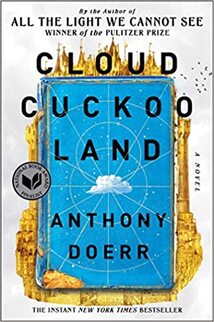|
One of humanity’s most defining characteristics has got to be the desire to make records, keep them, and share them with the next generation. And yet, obstacles to such a pursuit have run rampant throughout history. In the middle ages, despite the best efforts of scribes, “one bad-tempered abbot, one clumsy friar, one invading barbarian, an overturned candle, a hungry worm – and all those centuries are undone.” (172) And perhaps one day in the not-too-distant future, as Anthony Doerr imagines, paper will be obsolete, such that our species will be reliant on our virtual memory, as data stored only in computer systems.
The associated reverence is mocked as superstition in the middle ages, or labeled academic pursuit in modern day, and later, attributed to nostalgia in centuries to come. However, by then, no one can deny the beauty of such a craft, or the way stories have an ability to entwine their way into our personal lives, soothing us, and directing our own hopes and dreams.
Perhaps expectedly, the advancement of technology – while astoundingly imaginative – is what is most mocked in this text. A cannon so large that it could destroy a city – at the expense of beloved livestock that hauled it to battle? A bomb so sophisticated that it can be operated with a cell phone – at the expense of innocent children, including the one who assembled it? A ship so advanced it can transport the last humans on earth across the galaxy – at the expense of leaving their heritage behind? Reading all of this makes me recall the quote from the book I loved last month, Sea of Tranquility: "When we consider the question of why...there's been this increased interest in postapocalyptic fiction over the past decade, I think we have to consider what's changed in the world in that timeframe, and that line of thinking leads me inevitably to our technology...My personal belief is that we turn to post apocalyptic fiction not because we're drawn to disaster, per se, but because we're drawn to what we imagine might come next. We long secretly for a world with less technology in it." (190-1) That is, indeed, what Mr. Doerr’s characters seek by the end – simple lives. A view of the sunrise. The feel of dirt beneath their feet. Companionship. Air to breathe. And paper on which to record and share. Because whatever disasters they witnessed in their lifetimes, these characters conclude that by the end of their journey, “The world as it is is enough.” (568) You will live a hundred lifetimes in this book. Follow the threads, suspend your disbelief, and delight in the emerging tapestry on display in the final pages. Enjoy.
0 Comments
Leave a Reply. |
Author's Log
Here you will find a catalog of my writing and reflections. Archives
December 2022
|
